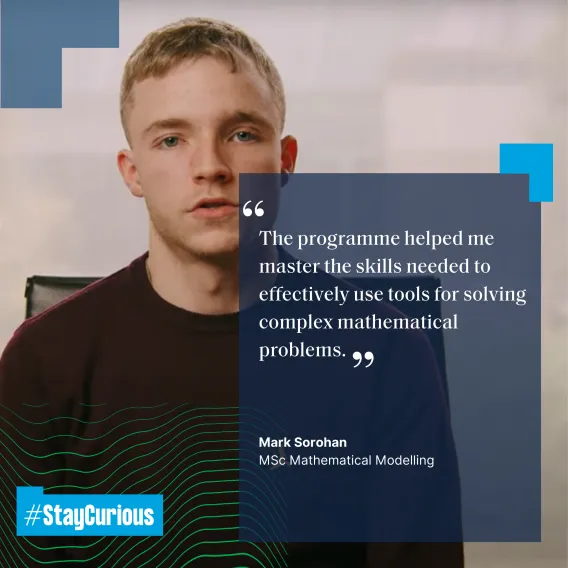
Course Details
Contact(s):
Apply Now
Read instructions on how to apply
Express InterestRegister your interest here for more information or to be notified when applications are open.
Brief Description
This MSc provides training in techniques of applied mathematics, and focuses mainly on mathematical models of real-world processes, their formulation in terms of differential equations, and methods of solutions, both numerical and analytical, of the models. The main emphasis of the course is on practical problems which arise in industry, commerce, medicine, and in the environmental and life sciences.
This course will provide training in techniques of applied mathematics, and will focus largely on mathematical models of real world processes, their formulation in terms of differential equations, and methods of solutions, both numerical and analytical, of the models. A focus of the course will be an emphasis on practical problems which arise in industry, commerce, medicine, as well as the environmental and life sciences. In particular, there will be a close alliance between the course and research problems in industrial applied mathematics, which is a principal research strand underpinning MACSI research.
Programme Aims:
- To provide a first year of intensive taught courses as part of a structured graduate programme for MACSI postgraduates and to enable graduates of engineering and other disciplines to redirect their training towards mathematical modelling.
The first two semesters will be examined on coursework from both a mandatory core and a suite of optional courses from which the student can choose. The coursework will be followed by the preparation of a dissertation over the summer months under close supervision. The dissertation will be at research level, and may focus on a problem that arises through MACSI’s connections with industry. The MSc can also be taken part time over a 2 or 3 year period, after consultation with the Course Director. This course will provide training in applied mathematics techniques and will focus on mathematical models of real world processes, their formulation in terms of differential equations and methods of solution – both numerical and analytical. Practical problems will be drawn from the industrial, commercial, medical, environmental and life science domains.
| Autumn | Spring | Summer |
3 elective modules to be chosen from:
|
2 elective modules to be chosen from:
|
|
| *The project should be submitted by mid-September. The dissertation will be at research level, and often (though not inevitably) be on a problem which arises through MACSI's connections with industry. | ||
The minimum entry requirement is a 2:2 undergraduate degree (Level 8 - National Qualifications Authority of Ireland) (or equivalent) in mathematics, or any related numerate discipline.
WHAT TO INCLUDE WITH YOUR APPLICATION:
- Qualification transcripts and certificates
- A copy of your birth certificate or passport
- A personal statement
- Two academic references
- If your qualifications have been obtained in a country where English is an official language this will suffice
- If this is not available, the following additional documents must be provided:
- English translation of your qualification(s)/transcripts AND
- English language competency certificate
- Please click here for Further Information on English Language Requirements
Guidelines on Completing your Application
• To ensure a speedy assessment of your application, please upload the above documents with your application form – your application cannot be assessed until relevant documentation is uploaded
• Please title appropriately any documents you are uploading with the application form, for example "Supporting Statement", "Undergraduate Transcript", "Postgraduate Transcript", "English Language Certificate" etc.
International students can find more information on eligibility requirements here.
EU - €7,900
Non-EU - €20,100
Once registered, students can apply to pay their fees in instalments. A request for a payment plan should be emailed to student.fees.office@ul.ie.
Further information on fees and payment of fees is available from the Student Fees Office website. All fee related queries should be directed to the Student Fees Office (Phone: +353 61 213 007 or email student.fees.office@ul.ie.)
Please click here for information on funding and scholarships.
Financial services including accounting, international banking, lending analysis and investment analysis; information and communication technologies; engineering industries (e.g. environmental, electronics, aerospace and automobile); scientific research (e.g. medical, social, economic, engineering, computing, industrial, fisheries, biological and mathematical); data analysis including market research and demographics; manufacturing (including production planning and quality control), research and development, especially in the pharmaceutical and biotechnology industries; mathematics education (teaching and lecturing).

Still Curious?
The team from the Faculty of Science & Engineering regularly host and take part in webinars to support future students. If you would like to learn more or ask questions at an online information session, click below.
Graduate and Professional Studies
+353 (0)61 234377
University of Limerick, Limerick, Ireland
Contact Us | Download Prospectus | Sign up to stay informed | Quality and Feedback